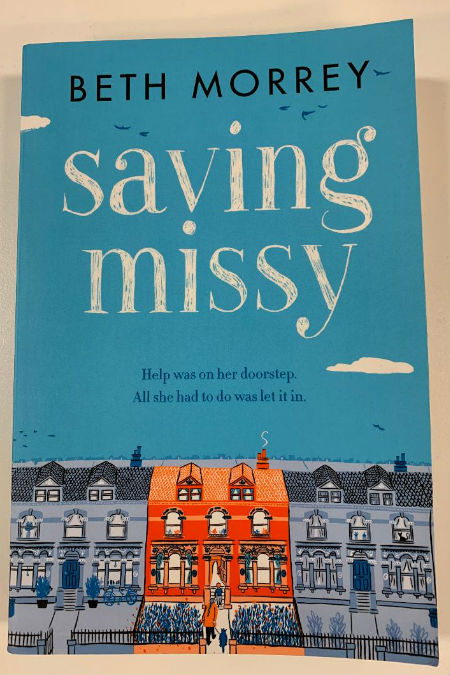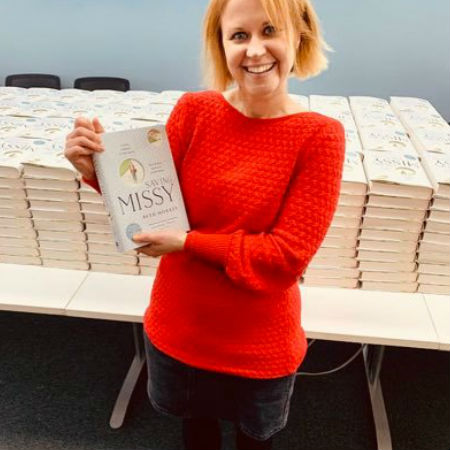
Missy Carmichael needs saving.
Though at the time we meet her, at the start of Beth Morrey’s delightfully warm and insightful debut novel, Saving Missy, she would no doubt disagree with any assessment that she needs any kind of help at all.
A 78-year-old English woman whose 79th birthday is looming altogether too large on the horizon, Missy or Millicent to every but very close loves ones, knows her life has shrunk to suffocatingly small proportions and that the promise and vivacity of her youth has fossilised into a life so undemandingly self-contained such that she rattles around in her large, antiques-filled home with little to no purpose.
But as we all know well, having a sneaking suspicion something is amiss and actually admitting it out loud are two altogether different things, a self-protective mechanism that means we can keep the truth at bay even if its outing culd potentially usher a new golden age of meaningful connection to others and a renewed sense of being alive.
Missy, in the first few chapters is lonely and unhappy, as her excessive wine drinking will attest, but even when she meets extrovert interior designer Sylvie and her friend Angela and her five-year-old son Otis in the park one day, she isn’t prepared to admit, initially at least, that she needs them.
Or that they would want to have a bar of her.
“Later on though, when the light faded, the lamp and blanket looked rather snug. I skipped cereal for once and cooked myself some pasta, eating it off a tray on the sofa while I watched some new period drama. Leo would have scoffed at the anachronisms, but it was a relief to be pulled in by gentle domestic tribulations. I considered rounding my evening off with a glass of wine but remembered I’d finished the bottle the night before. Ah well, I could always buy another tomorrow. Who knew who I’d bump into?” (P. 25)
But it turns out they do, finding ways to insinuate themselves, in the loveliest and most giving ways possible into Missy’s tiny, sclerotic life.
Angela, a foul-mouthed but lovable force of nature with a ranty position on everything, is in need of a babysitter, companionship and a sounding board, pretty much in that order and it isn’t long until she and Otis, who becomes a surrogate grandchild with Missy’s own grandson Arthur all the way over in Australia, are very much a part of their new friend’s life.
In no time flat, Otis and Missy are spending huge amounts of time together, with Angela and Missy catching up for morning tea or discussing the issues of the world in the latter’s home and through an urgent sent of circumstances, giving a home to a dog named Bob aka Bobby who triumphs over Missy’s antipathy towards canine pets to become the very centre of her life.
Sylvie becomes an integral part of Missy’s world, going through her attic and the treasure trove of family knickknacks and heirlooms it contains, re-decorating the sprawling, once largely-empty house so it looks like a home once more, and through dog walker friends like gay IT millionaire Denzil, expanding Missy’s network of friends so that they become an “oikos” or tight network that most closely resembles a family.
Missy is thrilled and intimidated all at once, carrying a long-seated sense that she is not lovable or worthy of love and her pre-Sylvie and Angela & Otis state of affairs is essentially what she deserves.

Through flashbacks told in chapters that are placed between events of the present day, we come to know Missy, husband Leo (who is longer on the scene; quite how is revealed in an unexpected twist towards the end), children Alistair and Melanie and the many and varied ways in which Missy’s life has both fulfilled and evaded its initial promise.
What adds real weight and poignancy to Saving Missy, which could have been just another lightweight entry in what could conceivably be called Domestic Redemption Lit – a genre that provides a great deal of pleasurable reading but few real penetrating insights – is the profound regret and sense of loss that grips Missy.
It is present right throughout her life, and while you could look at Missy’s life and see someone who has ticked a host of laudable boxes from seemingly happy marriage to well-adjusted kids, the truth is darker and more complex, something that Morrey is happy to explore in ways that add heft to a richly-warm and engaging narrative.
Missy, and indeed Angela, Sylvie and the others are not simply props that facilitate the onward progression of the story, cardboard cutout people with no real depth of humanity but people so real and hopeful and flawed that relating to them is almost instinctive.
You can’t help but feel like you know these people, that you are them and they are you, that you are Missy wishing for a bigger more expansive life and yet oddly but relatably afraid of what its arrival could mean.
“Sensing my unease, Bobby, nuzzled her head against my arm. I put it around her and caressed the soft fur, breathing in her warm scent, lulled by the gentle sighs and snores that surrounded me. Last year I’d so longed for things to be different, but now I wanted everything to stay the same. Semper eadem. That was my resolution right there. carry on as we were.” P. 266)
Saving Missy is grounded and gritty and real in a way that many books of this burgeoning genre are not.
It addresses very real issues of personal disappointment and lack of fulfillment, social isolation and fractured family units, the breakdown of relationships for all kinds of reasons and the growing malaise of disconnection and lack of engagement in society, an especially ironic development given the hyper connectivity of our current digital age.
But Saving Missy also offers up hope and the very real promise of what connection to others can mean, how a simple kind word or action, seemingly inconsequential in the grand scheme of things, can burgeon into something far more powerful and life-transforming than anyone can imagine.
This delightfully-written, emotionally-resonant novel champions the idea of the village, the idea that we need each other in ways too innumerable to mention and that poet John Donne’s declaration that “no man is an island” (or that should be “No Missy is an island”) is as apt now as it was when he first penned those words back in the early seventeenth century.
Missy needs saving and she needs people, we all do of course, and Saving Missy is a gloriously uplifting love letter to this singularly enriching great truth, full of richly-wrought characters, sparklingly meaningful dialogue and an enduringly reassuring sense that if we open ourselves up to deeply-meaningful connections with other people, that our life could change in ways that will alter who we are, for the very better, forever.